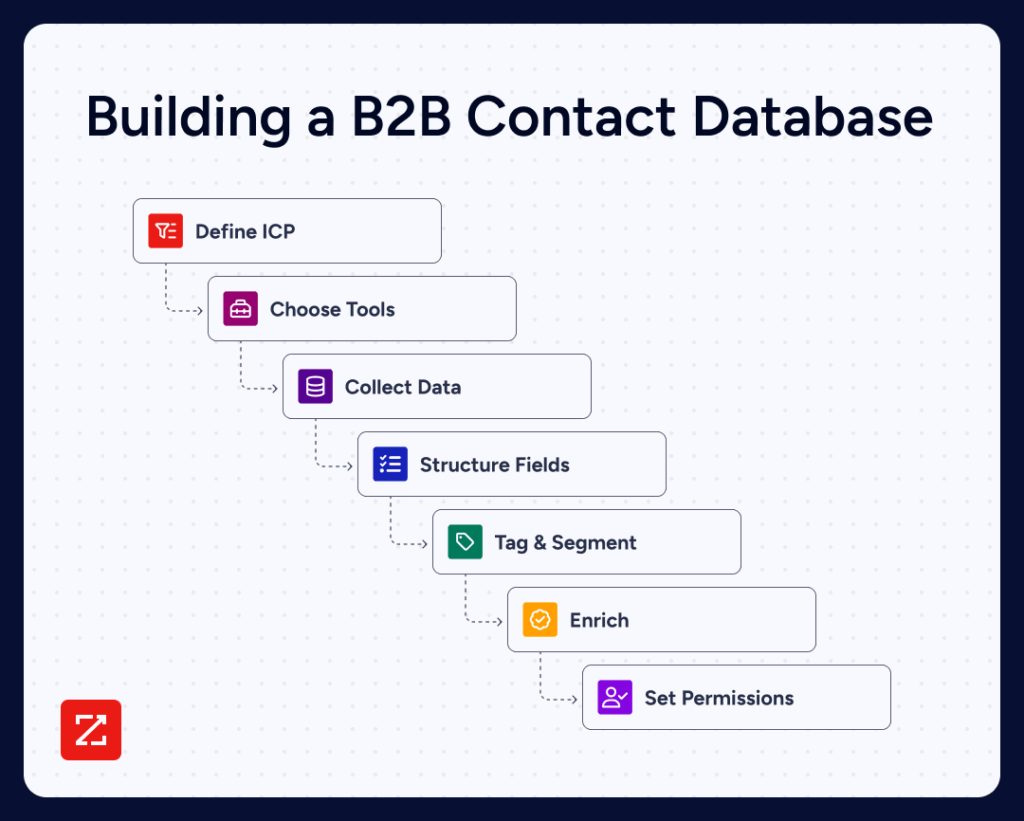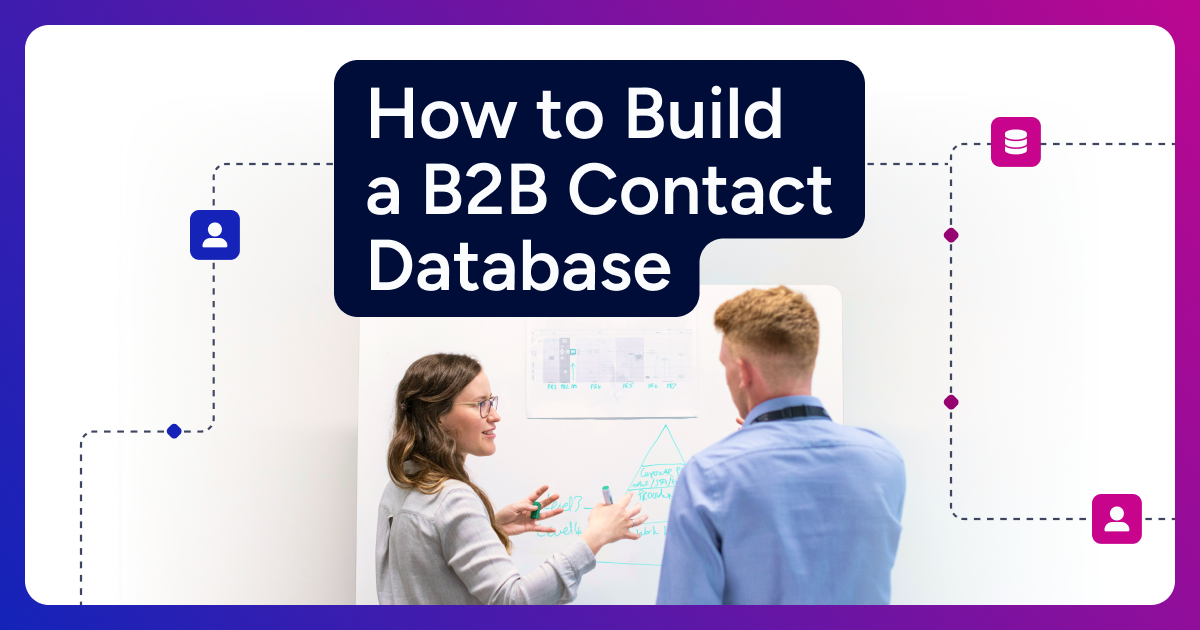Go-to-market success hinges on how well you can connect with the right people at the right companies, at scale. Whether you’re launching a new campaign, filling pipeline, or prioritizing outreach, it all starts with one critical asset: your contact database.
A strong contact database powers every interaction across sales, marketing, and customer success, enabling you to target precisely, personalize outreach, and prioritize the best opportunities. But building and maintaining that database takes a smart strategy, the right tools, and ongoing attention.
In this guide, we’ll break down what a B2B contact database is, why it’s essential, and exactly how to build one that fuels revenue growth. Whether you’re just getting started or looking to level up your existing system, this post will walk you through the must-have features, best practices, and top solutions to help your GTM teams work faster and smarter.
What is a B2B Contact Database?
Types of Contact Databases
There are various types of contact databases, each catering to different business needs. Here are the most common types:
Key Components of an Effective Contact Database
A database is only as useful as the information it stores. An effective contact database goes well beyond the basics to wrap context, signals, and intelligence around core contact data:
Accurate contact information (name, email, phone, LinkedIn)
Company details (industry, size, revenue, location)
Engagement history (calls, emails, content downloads)
Buying signals and intent data
CRM or sales tool integrations
Data security and compliance with regulations such as GDPR
Why is a B2B Contact Database Essential for Your Business?
A clean, comprehensive, and actionable contact database is foundational for any modern go-to-market (GTM) motion. Here’s why:
1. Can a Contact Database Improve Customer Relationship Management?
Track engagement, personalize communication, and manage your pipeline with greater precision. A more personalized approach will enhance customer satisfaction, fostering loyalty that leads to repeat business and referrals.
2. How does a Contact Database Enhance Marketing and Sales Efficiency?
Targeted campaigns based on verified data improve ROI. Access to accurate and up-to-date information allows your GTM teams to focus their efforts on high-value leads and opportunities. Your team spends less time chasing bad leads and more time closing real opportunities.
3. Why do Contact Databases Help Improve Decision-Making?
Sales, marketing, customer success, and revenue operations teams can all access the same up-to-date contact information, ensuring alignment and better forecasting. This centralization eliminates silos, promotes collaboration, and gives all relevant teams a holistic view of customer interactions. As a result, businesses can make data-driven decisions that are beneficial to both the business and its customers.
Key Features of an Effective B2B Contact Database
A modern B2B contact database is much more than simply a digital Rolodex. Done right, it’s a strategic asset. Here are the key features to look for:
How to Build and Maintain Your B2B Contact Database
Building and maintaining a quality contact database is the heart of any successful GTM motion. Creating one that hits the mark is a blend of smart strategy, reliable tools, and good hygiene.

Step-by-Step Guide to Creating a Contact Database
Define Your Ideal Customer Profile (ICP)Know who you’re targeting by clearly defining your ICP: industry, job title, company size, geography, and pain points.
Choose the Right ToolsUse platforms like ZoomInfo to source verified contact data. These tools integrate with CRMs and provide real-time enrichment.
Collect and Import DataImport contacts from LinkedIn, webinars, trade shows, gated content, and your website. Use web forms that sync with your CRM.
Structure Your Database FieldsInclude core fields (name, title, company, email, phone) and segmentation attributes (industry, revenue, tech stack, buying signals).
Tag and Segment Your ContactsUse tags or custom fields to group contacts based on interest, lifecycle stage, or role in the buying committee.
Enrich and Validate Your DataUse enrichment tools to auto-fill missing data and ensure accuracy. Remove duplicates and outdated records.
Set Access Controls and PermissionsLimit who can edit contact data to reduce errors and ensure data integrity.
Best Practices for Data Entry and Management
Consistency is key when entering data. Set clear guidelines for how information should be recorded to avoid discrepancies and confusion down the line. Here are some tips:
Standardize field formats (phone number formats, job titles)
Use dropdowns instead of free-text fields where possible
Train your team on proper data entry workflows
Avoid manual entry by automating imports from trusted sources
Regular Maintenance and Updating Strategies for Contact Databases
Your contacts database is only useful if it’s relevant, and B2B data changes and decays fast. Implement a routine to keep your database clean and updated, using automation for managing B2B contact data when possible. Follow these best practices to ensure your database continues to function as a valuable asset for your GTM teams:
Regular data audits (quarterly, monthly)
Ongoing deduplication
Update stale records
Monitor bounce rates to flag bad emails
Auto-enrich with trusted third-party tools like ZoomInfo
Ultimately, building and maintaining your B2B contact database is an ongoing process that demands consistent attention and a strong strategy.
Benefits of Using a B2B Contact Database for Sales and Marketing
Once your contact database is built and maintained, it becomes a powerful resource across your GTM team.
Targeted Outreach and Personalized Communication
With a well-organized database, you can segment audiences based on various criteria. Use this data to personalize your outreach like emails, LinkedIn messages, and call scripts. Tailored outreach improves engagement and response rates, but even more importantly, it fosters a sense of connection that makes prospects more likely to be receptive to outreach efforts.
Timely Outreach for Maximum Relevance
Timing is (almost) everything in sales and marketing. A well-built and maintained contact database empowers teams to plan outreach efforts for maximum relevance. With signals like recent hiring, funding, or product launches, you can time outreach when a prospect is most likely to buy and increase your odds of a positive response.
Connect with the Whole Buying Committee
Modern B2B deals are complex, involving multiple stakeholders. Done right, a contact database provides visibility into the roles and relationships between these groups and the right details to help you engage each person appropriately.
Choosing the Right B2B Contact Database Solution
With so many tools available, how do you choose the best contact database for your business?
Factors to Consider
Several factors come into play when selecting a contact database solution. As you evaluate your options, keep these considerations in mind:
Data accuracy and refresh rate: Look for providers that frequently validate and update their contact records so you’re always working with the most current, accurate data.
Scalability: Choose a platform that can grow with your business, with functionality that works the same for dozens of contacts to thousands (or even millions).
Target coverage: Make sure the contact database you choose has strong coverage in the regions and industries that matter most to your business.
Integration with your existing tech stack: Your contact database should easily connect with your CRM, marketing automation tools, and sales platforms for seamless workflows.
Compliance with regulations (GDPR, CCPA): Ensure your provider meets data privacy standards for the regions you contact and can support your compliance efforts.
Ease of use and UI/UX: A clean, intuitive use interface makes it easier for teams to adopt and get value from the tool quickly.
Customer support and onboarding resources: Strong onboarding, documentation, and support can help your team ramp up fast and troubleshoot any issues efficiently so you can keep focused on selling.
How ZoomInfo Fuels Your B2B Contact Database
By investing in a purpose-built B2B contact database and keeping it clean, accurate, and enriched, you set your marketing, sales, and RevOps teams up for success.
The most valuable B2B database solution will do more than provide names, job titles, and emails. As a comprehensive GTM Intelligence Platform, ZoomInfo goes beyond basic contact info to offer:
Real-time enrichment and validation
Buying signals and intent data
Org charts and buying committee mapping
Deep integrations with sales and marketing platforms
Custom segmentation and scoring
Global coverage across industries and functions
Whether you’re a lean sales team or an enterprise RevOps department, ZoomInfo enables faster, smarter GTM motions.
Building a high-quality B2B contact database is not just about collecting names; it’s about empowering your sales, marketing, and operations teams with the insights needed to drive predictable and accelerated revenue growth. By leveraging advanced data enrichment and GTM intelligence, your business can confidently identify, engage, and convert your ideal customers.
Ready to transform your contact database into a dynamic source of truth? Explore ZoomInfo’s B2B contact database solutions today.
Frequently Asked Questions
What is the best B2B contact database?
How do I create a B2B contact database?
Start by defining your ICP, use tools like ZoomInfo to collect and enrich data, structure and tag records in your CRM, and regularly audit and update your records.
What’s the difference between a CRM and a B2B contact database?
A CRM is a system to manage customer relationships. A contact database is a data layer that feeds into your CRM with clean, enriched contact details and segmentation data.


